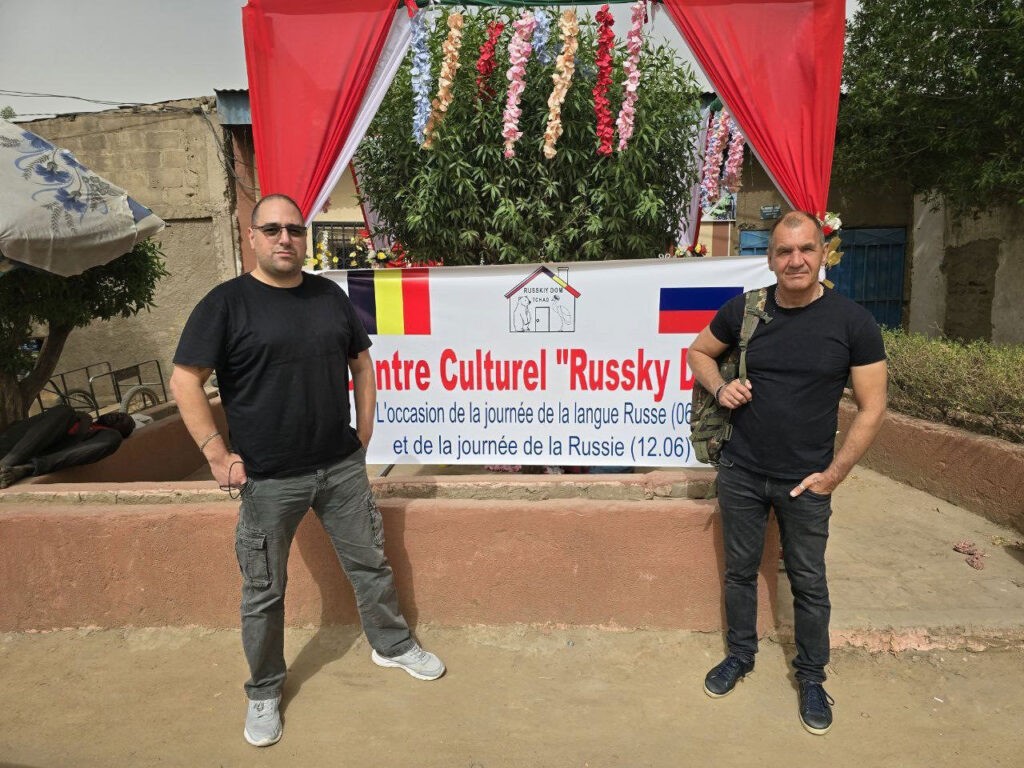ADF STAFF
The arrest of a shadowy political operative in Chad is shedding light on Russia’s efforts to interfere in the domestic affairs of African countries.
On September 19, 2024, Maxim Shugaley was detained at the airport in N’Djamena along with two Russian colleagues and one from Belarus. Shugaley is a notorious, globetrotting figure whose organization, “The Foundation for the Defense of National Values,” has close ties to the Russian mercenary Wagner Group and its late founder, Yevgeny Prigozhin. He was released by Chadian authorities after six days and has now returned to Russia.
In recent years, Shugaley has been spotted in countries including the Central African Republic (CAR), Madagascar, Mali, Sudan and Libya, where he spent 18 months in prison. He was formerly part of Russia’s troll farm known as the Internet Research Agency and has traveled widely, spreading pro-Russian propaganda, offering bribes to public officials and attempting to interfere in elections on behalf of Russia’s preferred candidates.
He identifies himself as a sociologist, but observers say his true aim is widening Russian influence. The CAR news site Corbeau News reports that he tends to appear in countries around election time under the guise of being an election observer or conducting opinion polls, but barely conceals his pro-Russia agenda.
“The presence of Shugaley in Chad is part of a larger Russian influence strategy in Africa through the activities of Wagner,” Alain Nzilo, the publisher of Corbeau, told ADF. “Really, for several years Russia has tried to establish its influence in Chad, but the country remains hesitant to formally engage.”
His history in Africa is checkered. In 2018, he allegedly offered cash to at least six candidates running for office in Madagascar, including a $2 million bribe to a former prime minister. In 2019, he went to Libya and worked on behalf of Saif al-Islam Gadhafi, the son of late dictator Moammar Gadhafi, in his attempt to gain power. Shugaley and his translator were arrested for election interference. In 2021, he arrived in the CAR and publicized surveys showing overwhelming support for Russia and CAR’s president. He screened a film, “Touriste,” that glorified the actions of Wagner and amplified anti-West messages. Shugaley himself is the subject of a two-part propaganda film portraying him as a James Bond-type figure.
Observers say his pattern is familiar.
“His communications operations in Africa use similar tactics,” Corbeau reported. “Repeated sharing of Russian stories on online platforms, appropriation of local social and cultural issues, use of local voices, artificial creation of political divisions, amplification of conspiracies and financing of partner non-governmental organizations which relay this communication.”
Prior to his arrest, Shugaley had made two trips to Chad around the time of the May 6, 2024, election and was photographed wearing a campaign hat emblazoned with a picture of President Mahamat Deby Itno. It is unclear how he ran afoul of authorities on the third trip, during which he was scheduled to attend an event at Russia House, a cultural center that supports Russian interests.
Chad is one of the few Sahelian countries that has not allowed Russian mercenaries to operate on its soil.
“The particular interest of Russians for Chad is explained by its strategic position,” Nzilo said. “It’s a major military power in Africa, but also an oil producing country. A rapprochement of Chad with Russia would have major repercussions for the regional military balance. However, the attempts at rapprochement have been in vain so far and Chad maintains its independent position.”
Some believe the Shugaley arrest is a sign that African nations are growing weary of Russian meddling.
“Chad’s actions signal a potential shift in how African nations view and respond to the presence of paramilitary groups like Wagner,” The Rio Times reported. “The [Shugaley] affair could mark a turning point in Wagner’s African operations. It may lead to increased scrutiny of the group’s activities and a reevaluation of its role in shaping the continent’s political and economic landscape.”

